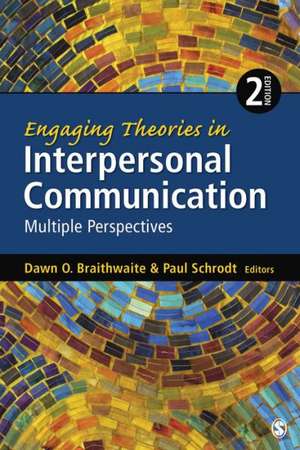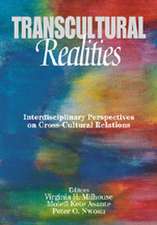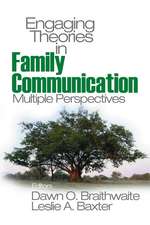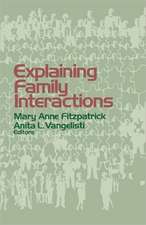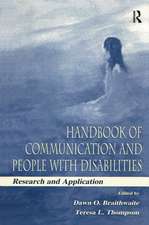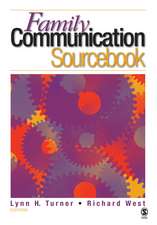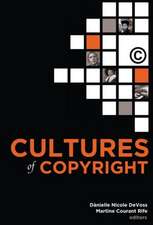Engaging Theories in Interpersonal Communication: Multiple Perspectives
Editat de Dawn O. Braithwaite, Paul Schrodten Limba Engleză Paperback – dec 2014
| Toate formatele și edițiile | Preț | Express |
|---|---|---|
| Paperback (2) | 466.96 lei 6-8 săpt. | |
| Taylor & Francis – 28 oct 2021 | 466.96 lei 6-8 săpt. | |
| SAGE Publications – dec 2014 | 836.31 lei 6-8 săpt. | |
| Hardback (1) | 937.55 lei 3-5 săpt. | +30.14 lei 7-13 zile |
| Taylor & Francis – 28 oct 2021 | 937.55 lei 3-5 săpt. | +30.14 lei 7-13 zile |
Preț: 836.31 lei
Preț vechi: 1145.63 lei
-27% Nou
Puncte Express: 1254
Preț estimativ în valută:
160.10€ • 167.05$ • 134.21£
160.10€ • 167.05$ • 134.21£
Carte tipărită la comandă
Livrare economică 12-26 martie
Preluare comenzi: 021 569.72.76
Specificații
ISBN-13: 9781452261409
ISBN-10: 1452261407
Pagini: 472
Dimensiuni: 152 x 229 x 21 mm
Greutate: 0.62 kg
Ediția:Second Edition
Editura: SAGE Publications
Colecția Sage Publications, Inc
Locul publicării:Thousand Oaks, United States
ISBN-10: 1452261407
Pagini: 472
Dimensiuni: 152 x 229 x 21 mm
Greutate: 0.62 kg
Ediția:Second Edition
Editura: SAGE Publications
Colecția Sage Publications, Inc
Locul publicării:Thousand Oaks, United States
Recenzii
"A highly beneficial contribution to the field with chapters that are clear and concise and illuminate the interesting and important aspects of interpersonal communication. With each chapter students are informed about the components of the theory and are also provided with examples that they can relate to, which really brings these theories to life."
"love this book for its insight, organization, and inclusiveness. I like that the authors use specific examples and then apply their theory to the examples for illustration-this is how students begin to learn how to use and understand theories. What an accessible, thorough, and user-friendly book."
"This book is clearly needed as our discipline is advancing almost exponentially in the area of theory and theory development. For so long we have relied, in whole or part, on the theories of other disciplines and consequently fragmented "readings." For students, this book provides an interpersonal link to what we've borrowed in the past and presents future implications of how we might take the current theoretical developments and use them to further test the respective theories or to guide subsequent research."
"Useful, thorough examination of interpersonal theories that will help my students apply theory competently to their own experience."
"This book had an excellent review of the relevant theories in Interpersonal Communication. The text was perfect for an advanced undergraduate course."
"love this book for its insight, organization, and inclusiveness. I like that the authors use specific examples and then apply their theory to the examples for illustration-this is how students begin to learn how to use and understand theories. What an accessible, thorough, and user-friendly book."
"This book is clearly needed as our discipline is advancing almost exponentially in the area of theory and theory development. For so long we have relied, in whole or part, on the theories of other disciplines and consequently fragmented "readings." For students, this book provides an interpersonal link to what we've borrowed in the past and presents future implications of how we might take the current theoretical developments and use them to further test the respective theories or to guide subsequent research."
"Useful, thorough examination of interpersonal theories that will help my students apply theory competently to their own experience."
"This book had an excellent review of the relevant theories in Interpersonal Communication. The text was perfect for an advanced undergraduate course."
Cuprins
Introduction: Meta-Theory and Theory in Interpersonal Communication Research - Dawn O. Braithwaite, Paul Schrodt, and Kristen Carr
PART I: Individually Centered Theories of Interpersonal Communication
Action Assembly Theory: Forces of Creation - John O. Greene
Attribution Theory: Finding Good Cause in the Search for Theory - Brian H. Spitzberg and Valerie Manusov
Evolutionary Theories: Explaining the Links Between Biology and Interpersonal Communication - Tamara Afifi, Shardé Davis, and Amanda Denes
Goals-Plans-Action Theory of Message Production: Making Influence Messages - James Price Dillard
Imagined Interaction Theory: Mental Representations of Interpersonal Communication - James M. Honeycutt
Planning Theory of Communication: Goal Attainment Through Communicative Action - Charles R. Berger
Problematic Integration Theory and Uncertainty Management Theory: Learning to Hear and Speak to Different Forms of Uncertainty - Austin S. Babrow and Katie M. Striley
Relational Framing Theory: Drawing Inferences About Relationships From Interpersonal Interactions - Rachel M. McLaren and Denise Haunani Solomon
Supportive Communication Theories: Dual-Process Theory of Supportive Message Outcomes and Advice Response Theory - Graham D. Bodie and Erina L. MacGeorge
Theory of Motivated Information Management: Struggles With Uncertainty and Its Outcomes - Walid A. Afifi and Stephanie Robbins
PART II: Discourse/Interaction-Centered Theories of Interpersonal Communication
Communication Accommodation Theory: A Situated Framework for Relational, Family, and Intergroup Dynamics - Howard Giles and Jordan Soliz
Communication Theory of Identity: Multilayered Understandings of Performed Identities - Michael L. Hecht
Critical Approaches to Interpersonal Communication: Charting a Future - Leslie A. Baxter and Bryan Asbury
Critical Feminist Theories: Giving Voice and Visibility to Women’s Experiences in Interpersonal Relations - Julia T. Wood
Expectancy Violations Theory and Interaction Adaptation Theory: From Expectations to Adaptation - Cindy H. White
Face Theory: Goffman’s Dramatistic Approach to Interpersonal Interaction - Sandra Metts and William R. Cupach
Grounded Practical Theory: Theorizing Communicative Practices - Karen Tracy
Narrative Theories: Making Sense of Interpersonal Communication - Jody Koenig Kellas
Politeness Theory: How We Use Language to Save Face - Daena J. Goldsmith and Emily Lamb Normand
Relational Dialectics Theory: Navigating Meaning From Competing Discourses - Leslie A. Baxter and Kristen M. Norwood
Speech Codes Theory: Traces of Culture in Interpersonal Communication - Gerry Philipsen
PART III: Relationship-Centered Theories of Interpersonal Communication
Affection Exchange Theory: A Bio-Evolutionary Look at Affectionate Communication - Kory Floyd, Colin Hesse, and Mark Alan Generous
Attachment Theory: A Communication Perspective - Laura K. Guerrero
Communication Privacy Management Theory: Significance for Interpersonal Communication - Sandra Petronio and Wesley T. Durham
Interpersonal Deception Theory: Purposive and Interdependent Behavior During Deceptive Interpersonal Interactions - Judee K. Burgoon and David B. Buller
Media Multiplexity Theory: Technology Use and Interpersonal Tie Strength - Andrew M. Ledbetter
The Relational Turbulence Model: Communicating During Times of Transition - Leanne K. Knobloch
Stage Theories of Relationship Development: Charting the Course of Interpersonal Communication - Paul A. Mongeau and Mary Lynn Miller Henningsen
Social Exchange Theories: Calculating the Rewards and Costs of Personal Relationships - Laura Stafford
Social Information Processing Theory: Impressions and Relationship Development Online - Joseph B. Walther
PART I: Individually Centered Theories of Interpersonal Communication
Action Assembly Theory: Forces of Creation - John O. Greene
Attribution Theory: Finding Good Cause in the Search for Theory - Brian H. Spitzberg and Valerie Manusov
Evolutionary Theories: Explaining the Links Between Biology and Interpersonal Communication - Tamara Afifi, Shardé Davis, and Amanda Denes
Goals-Plans-Action Theory of Message Production: Making Influence Messages - James Price Dillard
Imagined Interaction Theory: Mental Representations of Interpersonal Communication - James M. Honeycutt
Planning Theory of Communication: Goal Attainment Through Communicative Action - Charles R. Berger
Problematic Integration Theory and Uncertainty Management Theory: Learning to Hear and Speak to Different Forms of Uncertainty - Austin S. Babrow and Katie M. Striley
Relational Framing Theory: Drawing Inferences About Relationships From Interpersonal Interactions - Rachel M. McLaren and Denise Haunani Solomon
Supportive Communication Theories: Dual-Process Theory of Supportive Message Outcomes and Advice Response Theory - Graham D. Bodie and Erina L. MacGeorge
Theory of Motivated Information Management: Struggles With Uncertainty and Its Outcomes - Walid A. Afifi and Stephanie Robbins
PART II: Discourse/Interaction-Centered Theories of Interpersonal Communication
Communication Accommodation Theory: A Situated Framework for Relational, Family, and Intergroup Dynamics - Howard Giles and Jordan Soliz
Communication Theory of Identity: Multilayered Understandings of Performed Identities - Michael L. Hecht
Critical Approaches to Interpersonal Communication: Charting a Future - Leslie A. Baxter and Bryan Asbury
Critical Feminist Theories: Giving Voice and Visibility to Women’s Experiences in Interpersonal Relations - Julia T. Wood
Expectancy Violations Theory and Interaction Adaptation Theory: From Expectations to Adaptation - Cindy H. White
Face Theory: Goffman’s Dramatistic Approach to Interpersonal Interaction - Sandra Metts and William R. Cupach
Grounded Practical Theory: Theorizing Communicative Practices - Karen Tracy
Narrative Theories: Making Sense of Interpersonal Communication - Jody Koenig Kellas
Politeness Theory: How We Use Language to Save Face - Daena J. Goldsmith and Emily Lamb Normand
Relational Dialectics Theory: Navigating Meaning From Competing Discourses - Leslie A. Baxter and Kristen M. Norwood
Speech Codes Theory: Traces of Culture in Interpersonal Communication - Gerry Philipsen
PART III: Relationship-Centered Theories of Interpersonal Communication
Affection Exchange Theory: A Bio-Evolutionary Look at Affectionate Communication - Kory Floyd, Colin Hesse, and Mark Alan Generous
Attachment Theory: A Communication Perspective - Laura K. Guerrero
Communication Privacy Management Theory: Significance for Interpersonal Communication - Sandra Petronio and Wesley T. Durham
Interpersonal Deception Theory: Purposive and Interdependent Behavior During Deceptive Interpersonal Interactions - Judee K. Burgoon and David B. Buller
Media Multiplexity Theory: Technology Use and Interpersonal Tie Strength - Andrew M. Ledbetter
The Relational Turbulence Model: Communicating During Times of Transition - Leanne K. Knobloch
Stage Theories of Relationship Development: Charting the Course of Interpersonal Communication - Paul A. Mongeau and Mary Lynn Miller Henningsen
Social Exchange Theories: Calculating the Rewards and Costs of Personal Relationships - Laura Stafford
Social Information Processing Theory: Impressions and Relationship Development Online - Joseph B. Walther
Descriere
Highlights the key theories used to guide interpersonal communication research, featuring chapters written by leading scholars in the field. Both classic and cutting edge theories are explored, and applications of the theory in question are discussed in each chapter.
Notă biografică
Dawn O. Braithwaite (PhD, University of Minnesota) is a Willa Cather Professor of Communication, University of Nebraska-Lincoln, USA. She studies discourse-dependent families, dialectics of relating, and communication rituals in stepfamilies and voluntary kin. She has published 6 books and over 130 articles and chapters. A Distinguished Scholar of the National Communication Association and Western States Communication Associations, Braithwaite received NCA’s Bernard J. Brommel Award for Family Communication and the Becker Distinguished Service Award. She is the Past President of NCA and WSCA.
Paul Schrodt (PhD, University of Nebraska-Lincoln) is the Philip J. and Cheryl C. Burguières Professor in the Department of Communication Studies at Texas Christian University, USA. He studies communication processes that facilitate family relationships, with a particular interest in conflict and stepfamily functioning. He has authored more than 100 journal articles and book chapters, has received the National Communication Association’s Bernard J. Brommel Award for Family Communication, and served as Editor of Communication Monographs.
Paul Schrodt (PhD, University of Nebraska-Lincoln) is the Philip J. and Cheryl C. Burguières Professor in the Department of Communication Studies at Texas Christian University, USA. He studies communication processes that facilitate family relationships, with a particular interest in conflict and stepfamily functioning. He has authored more than 100 journal articles and book chapters, has received the National Communication Association’s Bernard J. Brommel Award for Family Communication, and served as Editor of Communication Monographs.
